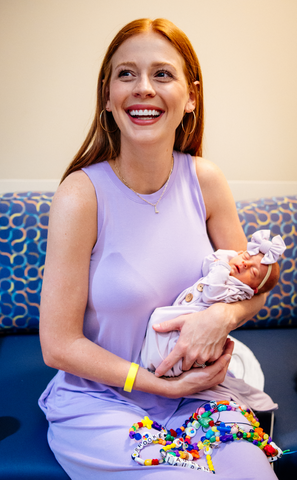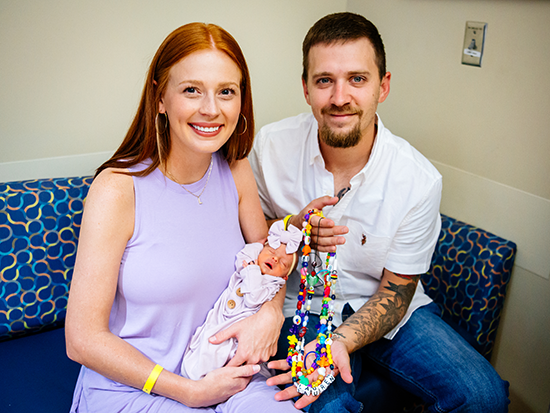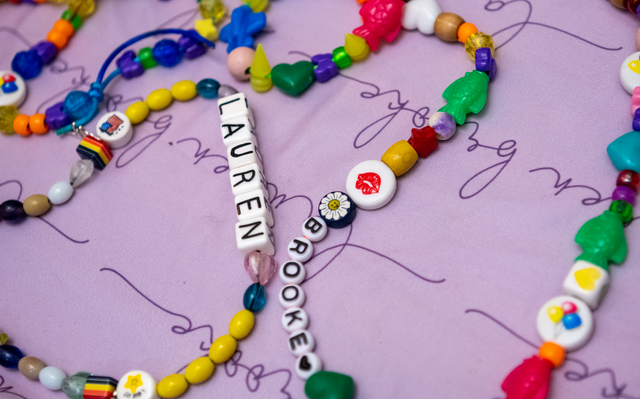 On the 26th anniversary of her heart transplant, Brooke found out she was pregnant with Lauren.
On the 26th anniversary of her heart transplant, Brooke found out she was pregnant with Lauren.
Photography: Hannah EcholsIn August of 1995, the Miley family found themselves in a hospital room celebrating the arrival of their newest addition, a baby girl named Brooke. A year later, the family was back in the hospital for a different reason. Brooke had restrictive cardiomyopathy, a life-threatening condition that the hospital could not treat.
The Mississippi family raced over three hours to the University of Alabama at Birmingham Hospital in search of a specialist who could save Brooke’s life. Five weeks later, at only 15 months old, she received a lifesaving heart transplant performed by cardiothoracic surgeon James Kirklin, M.D., through Legacy of Hope and the UAB Heart Transplant Program.
In 2019, Brooke had complications with her kidneys, leading to her second transplant. She received a kidney from her husband only 10 months after they were married.
Almost 27 years later, Brooke Miley Lillie found herself back in a UAB Hospital room — this time welcoming her own daughter, Lauren. It was a day many doubted would come as she was not only a heart transplant patient, but a kidney transplant patient as well.
“I always wanted to be a mom, but I knew the pregnancy risks were high because of my transplant, which concerned my family and my doctors,” Brooke said. “When my husband donated his kidney for my second transplant, this made pregnancy risks even higher for me. We knew we wanted to try to have a baby, and I knew UAB would play a big role in my life once again.”
Double the transplant, double the risk
On the 26th anniversary of her heart transplant, Brooke found out she was pregnant and notified her UAB cardiology team. She was connected with the UAB maternal-fetal medicine team, who specialize in high-risk pregnancies. Together both teams created a plan of action to keep both Brooke and her baby safe throughout the pregnancy.
“Pregnancy in heart transplant recipients carries a very high risk of maternal morbidity and mortality, as well as fetal complications and loss,” said Joanna Joly, M.D., assistant professor in the Division of Cardiovascular Disease and the UAB Cardiovascular Institute. “Pregnancy can trigger the immune system to overreact and lead to significant rejection of the transplanted heart.”
 Brooke and Adam Lillie hold their daughter, Lauren, in the UAB Continuing Care Nursery.
Brooke and Adam Lillie hold their daughter, Lauren, in the UAB Continuing Care Nursery.
Photography: Hannah EcholsBrooke rotated between her local obstetrician and appointments in the Heart Transplant and High-Risk Obstetrics clinics. Her UAB team frequently assessed her heart function and closely surveyed for signs of rejection, including antibodies against her transplants. The pregnancy progressed smoothly until Brooke developed preeclampsia suddenly at 32 weeks.
Preeclampsia, characterized by severe high blood pressure and signs of damage to organ systems, can increase the risk of maternal and fetal morbidity. It increases the risk for both kidney injury and cardiovascular complications.
Brooke was rushed to the UAB Women and Infants Center. Given her high-risk pregnancy and the preeclampsia, the team gave her antenatal corticosteroids, which improve newborn outcomes in preterm births. Unfortunately, Brooke’s kidneys began showing signs of declining renal function. The team decided to proceed with a delivery via cesarean section as the best course of action for the safety of both mom and baby.
“With her history of a double transplant, it took a multidisciplinary team from maternal-fetal medicine, nephrology, cardiology, neonatology, and obstetrics anesthesiology,” said Akila Subramaniam, M.D., interim director and associate professor in the UAB Division of Maternal-Fetal Medicine. “We had to ensure she remained on the appropriate immunosuppressant medications during delivery to minimize the risk of injury to her transplanted organs.”
On June 30, 2023, Lauren Lillie was delivered almost two months early. She was admitted to the UAB Regional Newborn Intensive Care Unit, the only Level IV NICU in Alabama.
“I realized what my parents probably felt like when they rushed me to UAB as a baby,” Brooke said. “I worried about Lauren being delivered early, but I had spent my whole life being cared for by UAB and knew that they had the experts and resources to care for both of us.”
A full-circle moment
While Brooke’s heart transplant saved her life, her unique medical journey was far from over. For her family, each procedure, operation and test represented a significant milestone. To celebrate the milestones, Brooke was enrolled in the UAB Bravery Beads program for children admitted to UAB cardiology and transplantation.
After every procedure or operation, Brooke received a unique, symbolic bead to add to her cord with her name on it. The program aimed to make it easier for children and their families to understand their medical conditions and provides a unique way for them to tell their story. The UAB Hospital Auxiliary expanded the program, now called “Beads of Courage” to the RNICU and Continuing Care Nursery in 2007.
 Brooke and Lauren both have their own beads that represent their medical milestones and unique journeys.
Brooke and Lauren both have their own beads that represent their medical milestones and unique journeys.
Photography: Hannah Echols
After Lauren was admitted to the RNICU, Brooke was excited to see the familiar program and enrolled her daughter.
“I held on to my beads because they remind me how much I went through and overcame growing up,” Brooke said. “Now Lauren will have her own beads that will tell her story.”
During Lauren’s stay in the RNICU and CCN, Brooke was visited by numerous staff who had become like family to her over the years. Being over three hours from home, her family also found themselves staying at the Ronald McDonald House Charities of Alabama once again, a place that had been their second home when Brooke was an infant.
Less than three weeks later, Brooke was finally going to be able to take Lauren home. Before she could leave, however, Brooke received one more surprise — a video visit from the surgeon who saved her life over 25 years prior.
“It was a pleasure getting to see Brooke again after all these years and help welcome her daughter,” Kirklin said. “It is a testament to the UAB team and the medical advancements over the years that someone like Brooke, with two organ transplants, has been able to live a full life and start a family of her own.”
The care provided by Kirklin allowed Brooke to participate in many normal activities throughout her life, such as show choir, track and cheer. She cheered at Jones College, where she met her husband. The life-changing care provided to Brooke by UAB providers continues to play a role in her ability to live a full life. Brooke is UAB’s second heart transplant patient to successfully give birth.
“Lauren is full of personality and is the sweetest, happiest baby,” Brooke said. “We would like to thank all of our care teams at UAB, as well as our local obstetrician, for working together to take such good care of us both. We could never express how thankful we are for our perfect little girl.”
Both Brooke and Lauren will return to Birmingham in July 2024 to represent Team MS for the Transplant Games of America. UAB Medicine is the presenting medical partner of the 2024 games.
